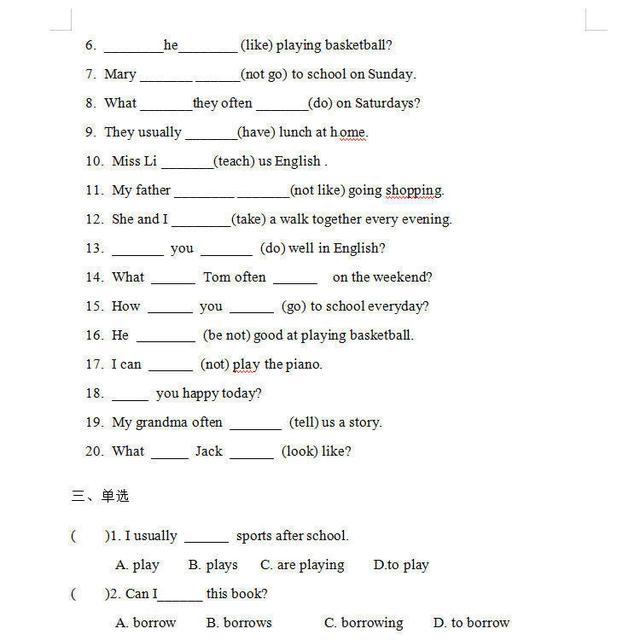仁爱版英语大学8大学上册Unit 1 Topic1-3 易混单词和短语分析
Topic 1 易混杂单词和短语分析
1. 分析:see sb. doing sth., see sb. do sth.
|
see sb. doing sth. |
意为“看见或人正在做某事”,偏重作业、动作正在进行。 |
|
see sb. do sth. |
意为“看见或人做某事”,标明看见作业、行为的全进程,动作现已结束。 |
如:He saw her cross the road.他看见她穿过了马路。
I saw her dancing at this time yesterday.昨日这个时分我看见她正在跳舞。
2. 分析:in the future, in future
|
in the future |
意为“在将来,将来”,指的是将来的某一时刻或某段时刻,不必定从如今初步。 |
|
in future |
意为“往后”,指从如今初步的今后,恰当于from now on。 |
如:I’m going to be a teacher in the future.将来我要当一名教师
In future I must do more reading.往后我得多读点书。
3. 分析: leave for, leave…for…, leave from
|
leave for |
指“前往某地”,leave为不及物动词,for后接地址名词。 |
|
leave…for… |
标明“脱离某地去某地(另一地)”,leave前是脱离之地,for后是抵达之地。 |
|
leave from |
标明“从某地脱离”,from后的地址是脱离的当地。 |
例:We are leaving for America tomorrow. 咱们明日将启航去美国。
They’ll leave Japan for France tomorrow.
他们明日将脱离日本前往法国。
I’m leaving from here. 我要脱离这儿。
4. 分析:hope, wish
|
hope |
指对完成某一期望有决心、有掌控,后不能跟复合宾语,只能跟动词不定式或从句。 |
|
wish |
常指难以完成或不能完成的期望,后可以跟复合宾语,即wish sb. to do sth.,也可接双宾语。 |
例:I hope to visit Beijing. 我期望去北京旅行。
I wish that I could fly like a bird. 我期望自个能像小鸟相同遨游。
5. 分析:get, arrive, reach
|
get |
是不及物动词,后跟地址名词时要用get to。 |
|
arrive |
是不及物动词,后跟地址名词时要用arrive in或arrive at。arrive in后跟相对较大的当地,arrive at后跟相对较小的当地。 |
|
reach |
是及物动词,这今后可以直接跟地址名词。 |
例:I 
will get to Beijing in two days.
= I will arrive in Beijing in two days.
= I will reach Beijing in two days.
我会在两天后抵达北京。
What time did you get/arrive/reach home? 你是几点到家的?
6. 分析:spend, cost, pay, take
|
spend |
spend…on / in …意为“花费”,主语是标明人的名词或代词,spend后接标明金钱或时刻的词,on后接名词,in后接v.-ing方法,也可省掉in。 |
|
cost |
cost意为“花费”,主语是标明物的名词或代词,常用于sth. cost sb. some money。 |
|
pay |
pay…for…意为“为……付款”,人作主语,常用pay some money for sth,pay的曩昔式和曩昔分词为paid。 |
|
take |
意为“花费”,常用规划为:It takes sh. some time to do sth.,或人花费……做某事。 |
例:I spent twenty yuan on the dictionary. 我花二十元钱买的这本字典。
The pen cost me ten dollars. 这支钢笔花了我十美元。
My mother paid 30 dollars for her sweater. 母亲买这件毛衣花了三十美元。
It usually takes me half an hour to go to school on foot.
7. 分析:join, join in, take part in
|
join |
“参加;参加”,一般用词,指参加党派、集体、人群或游戏活动等,变成 |
|
join in |
join sb. in标明“和或人一同做某事”;join in+某活动,标明“参加某活动”,恰当于take part in。 |
|
take part in |
“参加”,偏重参加群众性、集体性活动并在其间起活泼作用。 |
如:He joined the Party at the age of 18.他18岁入了党。
Won’t you join us in the play? 你不愿同咱们一同玩吗?
Students took active part in the sports meeting.学生们活泼参加运动会。
8. 分析:be good for, be good with, be good at
|
be good for |
对……有优点。 |
|
be good with |
长于唐塞……的;对……有办法。 |
|
be good at |
擅长……。 |
如:Fruit is good for your health. 生果对你的安康有优点。
She is good with the children. 她和孩子们共处极好。
I am good at playing the piano. 我擅长弹钢琴。
Topic 2 易混杂单词和短语分析
1. 分析:be ill, fall ill, feel ill
|
be ill |
意为“有病的,生病的”。偏重的是一种状况。 |
|
fall ill |
意为“患病,生病”。偏重的是动作,由安康到患病的进程。 |
|
feel ill |
意为“感触不舒畅”。偏重的是一种身体感触。 |
如:She is ill now.她正病着。
Don’t work too hard, or you will 
fall ill.作业不要太辛苦了,否则你会患病。
Are you feeling ill? 你如今觉得不舒畅吗?
2. 分析:some, any
|
some |
some多用于必定句,意为“一些;若干”。作定语时,既可以润饰可数名词,也可以润饰不可以数名词。some也可用于标明提出主张、聘请或恳求等的疑问句中。 |
|
any |
any多用于否定句、疑问句,有“任何的:一些”的意思。 any也可用于必定句中,标明“任一”。 |
如:Tom has some good friends at school.汤姆在学校有一些好兄弟。
There aren’t any trees behind the house.房子后边没有树。
Any man knows that.任何人都晓得那件事。
Can I have some meat? 我可以吃点肉吗?
3. 分析:another, the other, the others, others
|
another |
同类事物(三者或三者以上)中的“另一个”,标明不定数目中的“另一个”。 |
|
the other |
另一个。常用规划one…the other…—个……另一个……。 |
|
the others |
偏重在必定规模内的“其他悉数”。 |
|
others |
泛指“别人”,还可以指“其他的人/物”,指不断定的另一有些(并非是悉数)。 |
如:I don’t like this book; please give me another one.
我不喜爱这本书;请给我另外一本。
I have two pens; one is red, the other is blue.
我有两支钢笔;一支是红的,另一支是蓝的。
There are fifty students in our class, of which twenty are from the countryside and the others are from the city.
咱们班有50个学生,其间20
个来自村庄,其他的都来自城市。
He is my friend, who is always ready to help others.
他是我的兄弟,一个老是乐于助人的人。
4. 分析: so that, so… that….
|
so that |
so that意为“以便,为的是”,引导意图状语从句/成果状语从句。 |
|
so…that… |
so… that… 如此……致使于……,so是副词,这今后可跟描述词或副词,that引导成果状语从句。 |
例:Speak more slowly so that we can follow you better.
请逐渐说,以便咱们能非常好地跟上你说的。
He spoke so fast that no one could understand him. 他说得太快,没人能听得懂。
5. 分析:be angry with, be angry at
|
be angry with |
后接sb.,标明“对或人感到生气”。 |
|
be angry at |
后接sth., 标明“对某事感到生气”,at也可以用about替代。 |
如:The teacher is angry with the students.教师对学生们感到生气。
He was angry at what she said.他对她所说的话大为动火。
6. 分析:through, cross
|
through |
through穿过,经过,偏重从内部“穿过”,意义与in有关。 |
|
cross |
动词,意思是“穿过,经过”,指从物体的表面经过,穿过。 |
如:The thief got in through the window.小偷是经过这扇窗户进来的。
He saw her cross the road.他看到她穿过了马路。
7. 分析: the number of, a number of
|
the number of |
the number of“ ……的数量”,这今后接可数名词复数,做主语时,谓语动词用奇数。 |
|
a number of |
a number of 许多,这今后接可数名词复数,作主语时,谓语动词用复数。 |
例:The number of the students in our school is 2,000.
咱们学校的学生人数为2000。
A number of students are playing on the playground. 许多学生在操场上玩耍。
8. 分析:shout to, shout at
|
shout to |
标明“向……喊话”,以便让或人听见,没有责怪之意。 |
|
shout at |
标明“向……叫嚣、责怪”,多标明非好心肠对或人吼叫,有责怪之意。 |
如:He tried to talk to the men, but they shouted at him.
他设法和那些人谈,但他们却冲他大声嚷嚷。
He shouted to the girl and warned her of the danger.
他冲那个女孩大声喊,提示她留心风险。
Topic 3 易混杂单词和短语分析
1. 分析:win, beat
|
win |
意为“赢得,打败,打败”,后接war, game以及标明名次、奖品(金)等的名词作宾语。 |
|
beat |
标明“打败,打败”的意思,但后边只能接标明人的词作宾语。 |
如:He won a prize yesterday.他昨日得了一个奖。
We weren’t sure we could beat them.咱们没有掌控能打败他们。
2. 分析:interesting, fun
|
interesting |
描述词,有意思的;有招引力的。 |
|
fun |
描述词,逗乐的;风趣的;使人高兴的;名词,文娱;风趣的阅历;快乐喜爱。 |
如:The book is interesting.这本书很风趣。
The game looks fun.这个游戏看起来好玩。
3. 分析:bring, take
|
bring |
bring标明“拿来,取来”,指从别处把或人或某物带到说话者地址的地址来。 |
|
take |
take标明“带去,拿走”,指从说话者地址的当地把或人或某物带去别处。 |
例:Please bring your homework to school tomorrow.
明日请把你的作业带到学校来。
Take the book to your sister, please.
请把这本书带给你的姐姐。
4. 分析:excited, exciting
|
excited |
意为“令人激动的,令人振奋的”,常用来润饰事物。 |
|
exciting |
意为“感到激动的,感到振奋的”,主语一般是人。 |
如:I’m excited at the exciting news.这个令人振奋的消息让我很激动。
 微信扫一扫打赏
微信扫一扫打赏
 支付宝扫一扫打赏
支付宝扫一扫打赏



